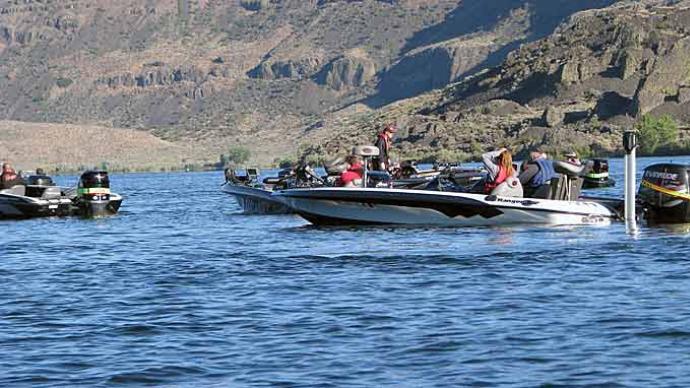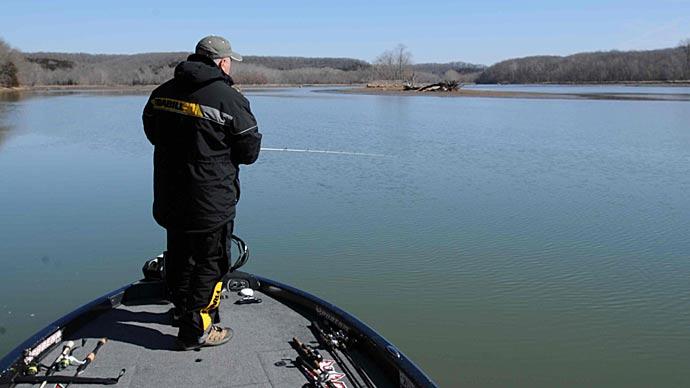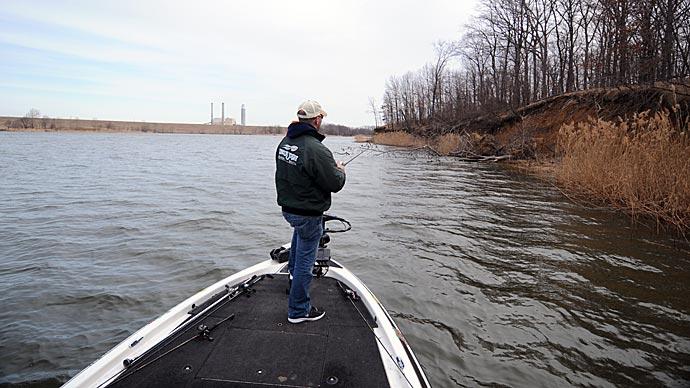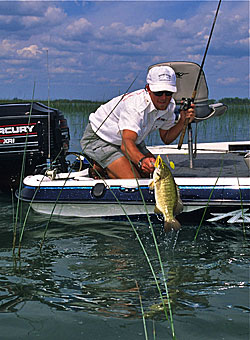
The decision to buy a new or used boat can result in a lot of trials and tribulations. There’s the decision of buying new or used? Fiberglass or aluminum? Local or out-of-state? Dealer or private individual? Each question has its own set of answers, and each answer hinges on the individual buyer.
One of the most obvious questions for boat buyers is new or used? It depends mainly on how much money you want to spend.
“Used boats can save you a lot of money,” offered Larry Carr, who has worked in the boating industry for nearly 40 years and currently works as a regional salesman for Mariner’s Enterprises which owns G-3 Boats.
“The best way to start is to decide on the boat you want and shop on the Internet,” said Carr. “There are many boating websites where you can get an idea of what the boat you’re considering is selling for, availability, and prices on used versus new boats. Good sites to look at include www.boattrader.com and www.walleyecentral.com. There are countless others.”
Keep an open mind. You might start looking for a particular brand, but an outstanding deal on a boat with low hours might be too good to pass up.
Most websites have boats listed by the manufacturer, so if you have a particular brand in mind, you can quickly check for the model you’re looking for. You can search on the NADA or Kelley’s Blue Book just like you would for cars or trucks to find the value and selling prices of boats.
Once you determine the boat's make, model, and length, you can decide if you want a new or used boat. “If you’re considering a new boat, you might want to look at available non-current models, " said Carr.
“These boats have been on the showroom floor or in the dealer's inventory for a year or two. They’re new, but just not the current model year. They come with a standard warranty, but the price will be substantially lower because they are devalued, and dealers will want to move them. A non-current boat may be the way to go, especially if you’re planning on keeping the boat for 6 or 8 years.”
Most pro anglers have a boat sponsor and get a boat every year that they have to sell at the end of the year. These boats are available at a substantial discount, rigged to the hilt, and have been put through their paces, so there should not be any mechanical problems.
If you’re looking for a used boat, do not limit yourself to local sellers or dealers. States with the highest number of boat registrations, like Michigan and California, also have the highest number of used boats available. These are ideal locations to begin your search. You might have to travel to pick the boat up, but it could save you big money in the long run on a good boat. The Great Lakes region is a bonanza for used boat buyers because of the volume of boats available there, the variety, and the fact that they have only been used in freshwater.
One important choice you will have to make when buying a boat is hull material. It can be aluminum or fiberglass. Each has its advantages. At a time, certain manufacturers were known for making a certain kind of boat. Ranger made glass bass boats, and Lund made aluminum walleye boats. Not anymore.
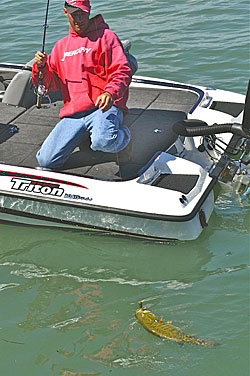
A big plus for buying aluminum is weight. An aluminum boat will weigh much less than a fiberglass boat of similar size. That can be important depending on your towing vehicle. If you have a mid-size truck or car, aluminum might be the way to go, especially if you’re towing long distances. Know your vehicle's maximum towing abilities, but don’t max it out. Error on the conservative side when looking at towing weight. Also, take into account where you’re going to be towing. If you’re towing in mountainous terrain or up and down hills, ensure you have more than enough towing capacity.
Because aluminum boats are lighter, you’ll get a better ride in a fiberglass boat. Hull weight generally equates to a smooth ride, something to consider if you are fishing big water where wind and waves are something to contend with.
Aluminum boats typically require less maintenance. Bang the dock or hit some rocks with an aluminum boat, and you have a dent. With a fiberglass boat, you could damage the gel coat. If it’s deep enough that the fiberglass is exposed, it’s best to have it repaired ASAP, as water could wick into the hull.
Because fiberglass is heavier than aluminum, it will take more horsepower and a bigger motor to power a glass boat than to get the same performance from a similar-sized boat made of aluminum. The bigger the motor, the more cost, and expense. When talking about powering a boat, it’s always better to have too much power than not enough. Check out the placard on the boat hull for recommendations on maximum horsepower and weight capacity ratings.
Four-stroke motors have the advantage of less maintenance, and the difference in power and weight between two-stroke and four-stroke motors is becoming less noticeable. Smaller kicker motors these days are almost exclusively four-stroke motors. They are quiet and great on gas.
Check out the accessories that come with the boat. On a new boat, they may be offered as a package. Electronics represent potential added costs and savings on any boat purchase. Included electronics and accessories on a new or used boat, like trolling motors, can represent significant savings.
In many ways, your new boat is only as good as the trailer. It doesn’t do you a darn bit of good to have a new boat and you cannot get it to the ramp! Trailers come in bunk or roller versions. Trailers featuring rollers make it easier to launch at undeveloped or primitive ramps. Bunks are fine where you have a nice paved ramp. A single-axle trailer might be adequate for an aluminum boat, but dual axles are a minimum for heavy fiberglass boats.
If buying a boat on a used trailer, check the bearings to see if they have bearing buddies and ask how recently they have been serviced. Check tires for wear that might indicate problems. Check the trailer frame for cracks and broken welds. Do the lights work? It might be the last time they are all functioning correctly.
Taking a used boat to a certified service agent will be money well spent. Check the hours on the motor. Can’t confirm the hours on the motor? Don’t buy it! If the boat is over 20 feet, you might consider having the boat surveyed.
“I’m constantly surprised by the number of boats bought without the buyer ever taking them for a ride!” joked Larry Carr. “If the owner doesn’t want to take you for a ride, don’t buy the boat!”


